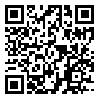BibTeX | RIS | EndNote | Medlars | ProCite | Reference Manager | RefWorks
Send citation to:
URL: http://tumj.tums.ac.ir/article-1-652-en.html
Background: This study have conducted in order to determine of direct or indirect effective factors on mortality of neonates with low birth weight by path analysis.
Methods: In this cohort study 445 paired mothers and their neonates were participated in Tehran city. The data were gathered through an answer sheet contain mother age, gestational age, apgar score, pregnancy induced hypertension (PIH) and birth weight. Sampling was convenience and neonates of women were included in this study who were referred to 15 government and private hospitals in Tehran city. Live being status of neonates was determined until 24 hours after delivery.
Results: The most changes in mortality rate is related to birth weight and its negative score means that increasing in weight leads to increase chance of live being. Second score is related to apgar sore and its negative score means that increasing in apgar score leads to decrease chance of neonate death. Third score is gestational age and its negative score means that increasing in weight leads to increase chance of live being. The less changes in mortality rate is due to hypertensive disorders in pregnancy.
Conclusion: The methodology has been used could be adopted in other investigations to distinguish and measuring effect of predictive factors on the risk of an outcome.
| Rights and permissions | |
 |
This work is licensed under a Creative Commons Attribution-NonCommercial 4.0 International License. |





